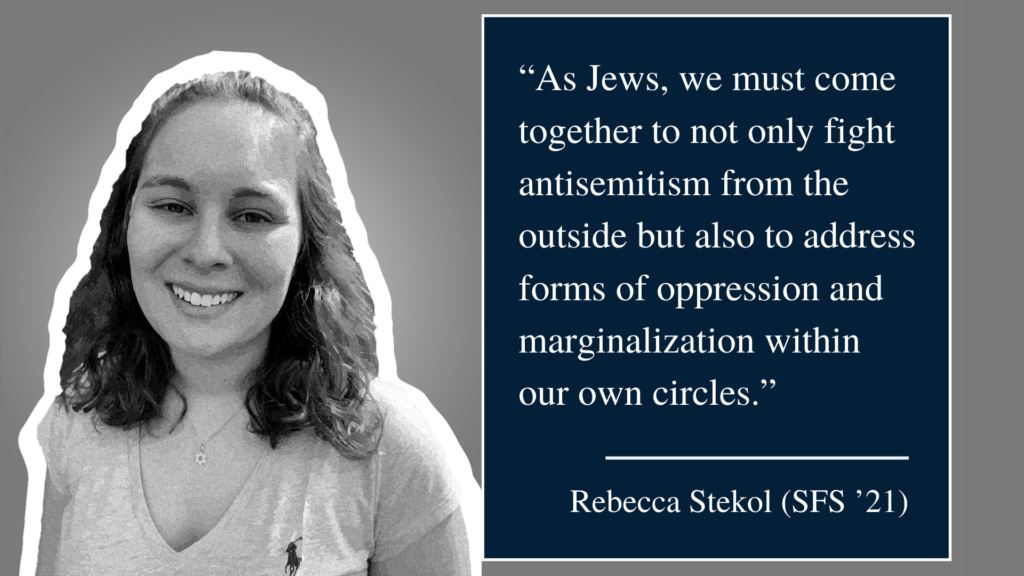As an American Jew, I am mortified, fearful and angry about the rise of antisemitism in the United States. While many news outlets — The New York Times, The Times of Israel and The Boston Herald, to name a few — call this trend a “rising tide,” I consider it more like a tsunami. The numbers prove it: The Anti-Defamation League’s 2019 Audit of Antisemitic Incidents reported that, in 2019, the number of antisemitic incidents was the highest on record since the audits began in 1979.
We are uneasy. We want to protect our collective community. For those of us who do not dress traditionally and thus blend in more, we worry for the safety of Haredi, or ultra-Orthodox, Jews who have been targeted in numerous attacks. Unfortunately, I have found that this well-intentioned concern has steered some members of the American Jewish community away from engaging in honest and balanced dialogue about the injustices in our own traditions and institutions.
The gender dynamics in many Jewish circles, which can lead to the marginalization of Jewish women, is one such injustice. In March, Netflix released “Unorthodox,” a miniseries based on the true story of Deborah Feldman. The series depicts a young woman named Esty fleeing the ultra-religious Satmar Hasidic community in Brooklyn to begin a secular life in Berlin. Woven between the story of Esty’s time in Berlin are flashbacks of the strict religious norms of her Brooklyn community. Specifically, the flashbacks examine Esty’s arranged marriage and strained familial relationships.
The series received a lot of praise but also drew sharp criticism from Jews across the spectrum of observance about various factual errors the writers made in their portrayal of certain religious practices. In conversations at school and at home, my Jewish peers have voiced concerns that the highly critical depiction of Hasidic customs could pave the way for increased antisemitic sentiments among viewers with little to no interaction with Jewish people.
This fear is valid and one that I share. However, a large part of me aches for Esty and her feelings of marginalization, hopelessness and confinement within the unrelenting bounds of religious laws. In writing an autobiography and bringing her story to the future writers of the miniseries, Feldman bravely shone a spotlight on her years of emotional trauma as a woman in a Hasidic community. Crucially, she never claims to represent the voices of any religious Jewish women other than herself.
Reducing “Unorthodox” to a vehicle of slander and antisemitism sends a message that we cannot simultaneously fight antisemitism and recognize those people who have experienced alienation in Jewish communities. Additionally, the pushback against the series shows that some critics seem willing to push aside the voices of religious Jewish women when their stories reveal uncomfortable truths. Anyone who attempts to pick and choose the Jewish voices that deserve to be heard is not helping the fight against antisemitism.
The Jewish community and our allies must recognize that the fight against antisemitism is an intersectional movement. Standing up for all Jews requires us to engage with the many identities a Jew may have and the layers of oppression they face when those identities combine. For instance, Jewish women face both antisemitism and misogyny, so addressing one form of marginalization and not the other is careless.
Religious customs gender religious spaces. For example, holy sites like Jerusalem’s Western Wall require that men and women segregate, and women are underrepresented in Jewish and rabbinic studies. Therefore, it is vital that the broader Jewish community amplifies Jewish women’s voices and respects the legitimacy of their experiences — positive or negative.
The pernicious binary that critics pose between fighting antisemitism and engaging with the story behind “Unorthodox” can be resolved with a nuanced and understanding dialogue. First, it is vital to understand that “Unorthodox” paints a critical picture of the Satmar Hasidic community because it is told through the lens of one woman who had negative experiences. Neither Feldman nor the writers of the miniseries purport to convey that all Orthodox Jewish women feel oppressed for that, too, would undermine the agency of individual women to speak about their own perspectives.
When we realize that “Unorthodox” does not intend to generalize women’s experiences within Orthodox Jewish communities, we can then get at the heart of the issue: that there are some members within the Jewish community who feel trapped and marginalized within its societal pressures and power dynamics. Feldman’s story can be a springboard for working toward the reconciliation between honoring deeply held Jewish traditions and advocating for the dignity of those people who reject these traditions.
Every community must grapple with uncomfortable realities and criticisms. As Jews, we must come together to not only fight antisemitism from the outside but also to address forms of oppression and marginalization within our own circles.
Rebecca Stekol is a senior in the School of Foreign Service. Faith in Action appears online every other Tuesday.









